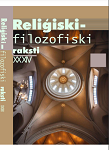SAREŽĢĪTĀ MANTOJUMA ĒTIKA
ETHICS OF DIFFICULT HERITAGE
Author(s): Solveiga Krūmiņa-KoņkovaSubject(s): Museology & Heritage Studies, Ethics / Practical Philosophy, Culture and social structure , Sociology of Culture
Published by: Latvijas Universitātes Filozofijas un socioloģijas institūts
Keywords: difficult heritage; dark heritage; heritage objects; difficult heritage ethics; heritage interpretation;
Summary/Abstract: Since the 1990s, the acknowledgment and public display of ‘difficult heritage’ have spread in many parts of the world. Very often, these processes are associated with complex ethical dilemmas. The article aims to provide insight into the ethical issues surrounding difficult heritage. Like any heritage, ‘difficult heritage’ differentiates between ‘living’ (as existing) and valuable life and supports human flourishing. Like any cultural heritage, memorials of difficult heritage have their own aesthetic, commemorative, scientific, moral, symbolic, and spiritual value, which can cause a wide range of emotional experiences. However, if cultural heritage is mainly associated with positive public evaluations, ‘difficult heritage’ often has negative connotations and thus poses more significant ethical challenges. How do we treat the unsettling and awkward legacy, which can not be celebrated or at least comfortably acknowledged as part of a nation’s valued history? How do we reconcile the general heritage concept’s positive associations with sites people experience as traumatic (Sandis 2014)? The article is based on an approach developed by Sharon Macdonald, according to which ‘difficult heritage’ is “a past that is recognized as meaningful in the present, but that is also contested and awkward for public reconciliation with a positive, self-affirming contemporary identity” (Macdonald 2009, 1). The author analyzes how ‘difficult heritage’ focuses on ‘negative self-history’ and provokes a troubling self-identity, perhaps invoking such emotions as shame and guilt or even defensive counter-reactions. Attention is paid to the ethical responses of different social groups. As someone from outside often reminds us of this legacy, ethical challenges are posed by how other players, practices, and knowledge - local and from afield – interact to shape how the traumatic past is variously approached.
Journal: Religiski-filozofiski raksti
- Issue Year: XXXIV/2023
- Issue No: 1
- Page Range: 183-199
- Page Count: 17
- Language: Latvian

